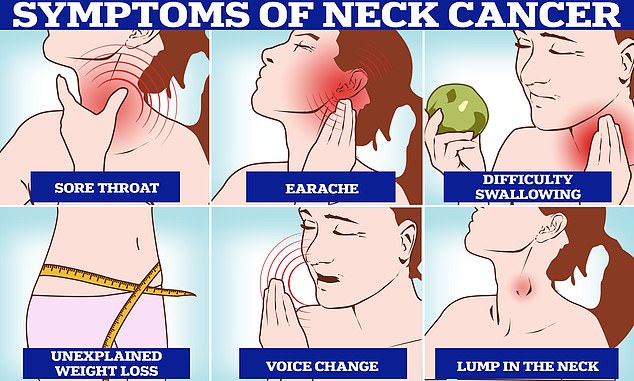Scientists have discovered that a bacteria commonly found in the mouth appears to “melt” and destroy certain types of cancer.
The researchers said they were “surprised” to find that head and neck cancer patients who had Fusobacterium inside their tumors had “much better outcomes.”
The exact biological mechanisms behind this link are being studied in depth by researchers at Guy’s and St Thomas’ College and King’s College London.
In the lab studies, the team placed quantities of bacteria in petri dishes with cancer cells and left them for a couple of days.
When they looked again at the bacteria’s effect on cancer, they found that there was a 70 to 99 percent reduction in the number of viable cancer cells in the head and neck after being infected with Fusobacterium.
According to the NHS, cancer symptoms can be difficult to spot. They include a sore throat, earache, difficulty swallowing and unexplained weight loss. Other key signs are changes in voice or the appearance of a lump in the neck.

Researchers said they were “surprised” to find that head and neck cancer patients who had Fusobacterium inside their tumors had “much better outcomes.”
A further analysis of 155 patients with head and neck cancer also showed that those who had the bacteria inside their tumors had better chances of survival compared to those who did not, with a 65 percent reduction in the risk of death.
Researchers hope the finding could help guide treatment for patients with head and neck cancer, which includes cancers of the mouth, throat, larynx, nose and paranasal sinuses.
Experts said there have been few therapeutic advances in head and neck cancer in the past 20 years, so it is hoped the discovery could potentially lead to new treatments in the future.
“Essentially, we found that when these bacteria are found in head and neck cancers, the outcomes are much better,” said senior author Dr. Miguel Reis Ferreira.
‘The other thing we found is that, in cell cultures, this bacteria is able to kill cancer.
‘This research reveals that these bacteria play a more complex role than previously known in their relationship with cancer: basically, they melt head and neck cancer cells.
“What this could mean is that we can use these bacteria to better predict which patients are more likely to have good or worse outcomes, and based on that, we could change their treatment to make it more benign in patients who have better outcomes or more intense in patients who are more likely to have their cancers come back.”
Dr Anjali Chander, a senior clinical research fellow at King’s College London and lead author, added: “Our findings are remarkable and very surprising.”
The team has published a paper on the discovery in the journal Cancer Communications, describing how Fusobacterium is “toxic” to head and neck cancer and how its presence “may determine a better prognosis.”
“Fusobacterium detectability was associated with better overall survival and better disease-specific survival,” the authors wrote.
Every year in the UK, almost 12,800 people are diagnosed with head and neck cancer and just over 4,000 people die from the disease each year.
In the United States, these figures amount to 71,000 diagnoses and just over 16,000 deaths.
Between 59 and 19 percent of patients with head and neck cancer will survive 10 years after their diagnosis, depending on the specific subtype of the disease.
Treatment for head and neck cancer usually consists of a combination of chemotherapy, radiation therapy, or surgery, although this may vary for each patient.
According to the charity Cancer Research UK, smoking is considered one of the biggest risk factors for head and neck cancer, accounting for up to 64 per cent of some specific forms of the disease in the UK.

